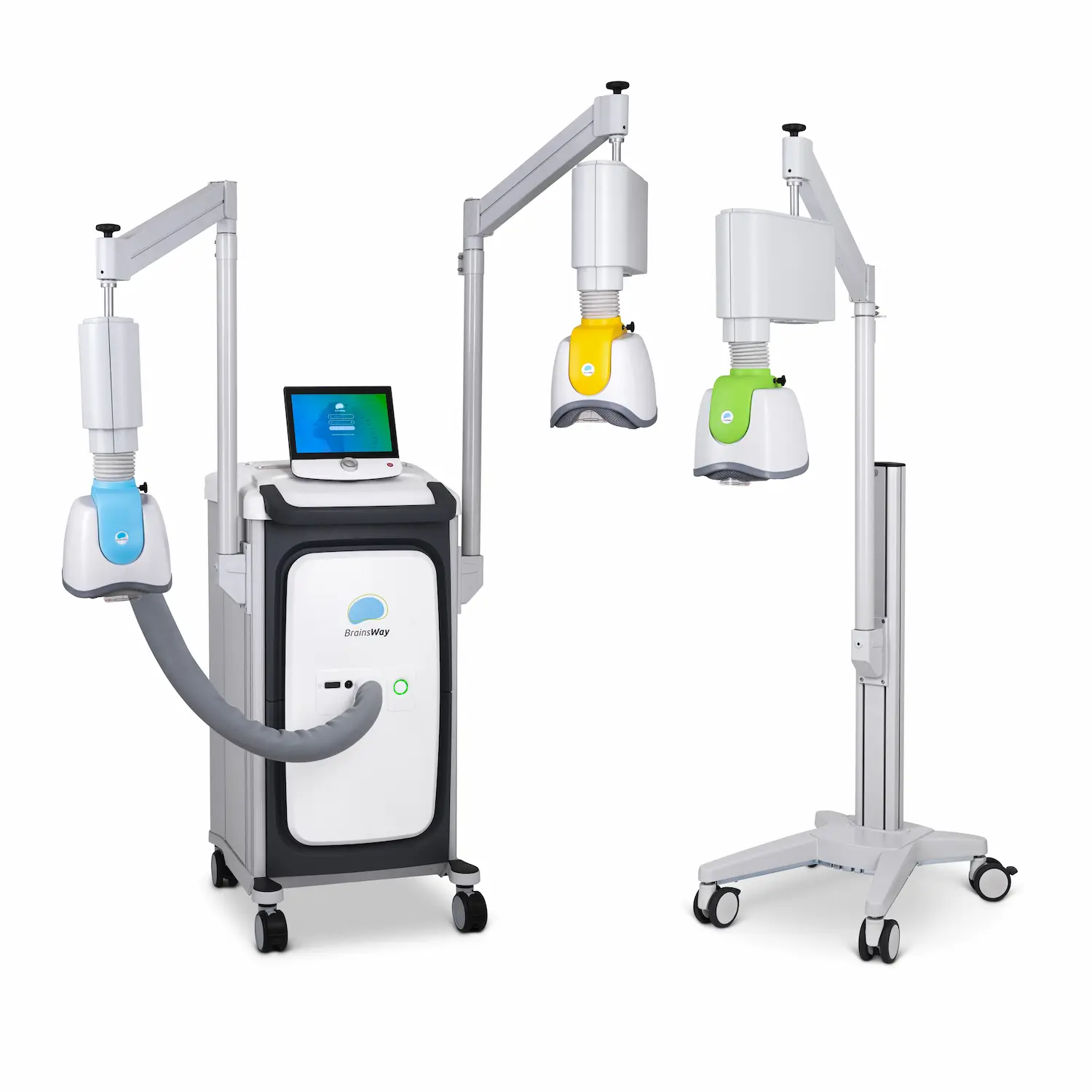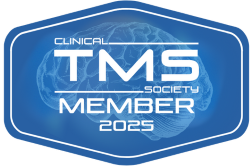
Transcranial magnetic stimulation (TMS) is a game-changer for those who haven’t found relief with traditional treatments like medication or talk therapy. Currently, BrainsWay Deep TMS™ therapy is approved by the Food and Drug Administration for treating major depressive disorder (MDD), obsessive-compulsive disorder (OCD), anxious depression, and smoking cessation. But many doctors also use it as an off-label treatment for a range of other mental and physical diagnoses. We’ll explore this in more detail in this article, but first, let’s understand how TMS works.
How Does TMS Work
TMS is a noninvasive treatment that uses magnetic fields to stimulate nerve cells in the brain. It targets specific brain regions associated with mood regulation and generates neuron activity to help patients get out of the depressive rut. Depression is a disease state of the brain network where wrong connections are formed or connections are dormant. TMS increases neuroplasticity—the brain’s ability to form new pathways.
Using this innovative technology, doctors calibrate the strength of the magnetic pulses to match the individual patient. Depending on the goal, they will also target different parts of the brain. For example, for depression, they will target the prefrontal cortex. And for OCD, that would be the pre-supplementary motor area.
It’s non-invasive, so the patient will only feel pulses from the magnets. Treatment is not uncomfortable, but it might take a little getting used to. A patient typically receives 36 treatments (each session lasting about 20 minutes, depending on the protocol). At Relief, the series begins with daily sessions, five days a week for six weeks, and tapers off for the rest of the treatments.
Off-Label Uses for TMS
While FDA approvals are somewhat limited in the United States, researchers and doctors are exploring TMS for treating other psychiatric diagnoses. In fact, numerous successful and carefully conducted clinical trials have been done to show the effectiveness of TMS. For instance, promising research indicates that TMS can also help alleviate symptoms of schizophrenia and enhance movement rehabilitation after a stroke.
Deep TMS has also received the European CE certification mark for Alzheimer’s Disease (AD), autism, bipolar disorder, chronic pain, multiple sclerosis (MS), Parkinson’s Disease, post-stroke rehabilitation, post-traumatic stress disorder (PTSD) and the negative symptoms of Schizophrenia.
Here are some top potential off-label treatments for TMS:
Eating Disorders
TMS is emerging as a promising treatment for individuals with eating disorders, such as anorexia nervosa and bulimia nervosa. Although it’s not yet FDA-approved for this specific use, TMS has shown encouraging results in reducing symptoms by targeting brain areas involved in mood regulation and impulse control. This non-invasive therapy can help alleviate anxiety and depressive symptoms often associated with eating disorders, potentially providing a new avenue for those who have not found success with traditional treatments.
Alzheimer’s Disease and Dementia
Alzheimer’s disease leads to progressive memory loss and cognitive decline. Scientists are still trying to figure out how the disease affects the brain. However, one study found that TMS could help. The study also noted that TMS could help improve cognitive function in those with Alzheimer’s. While there’s a need for more TMS research, the early findings are promising.
Migraines and Chronic Pain
Numerous studies show good evidence that TMS helps with migraines and chronic pain. In one study, people had about nine headache days in a month. After TMS therapy, they reported having fewer headaches often. The number of days they had headaches was reduced by about three days on average.
A NIH study backs this up, with findings showing that TMS reduces the frequency and severity of migraines. The evidence is somewhat limited, but what’s available shows TMS may be a safe and effective way to prevent or treat chronic migraines.
Post Stroke Rehabilitation
TMS has helped researchers improve their understanding of the mechanisms underlying the recovery of motor function after stroke. As a result, this has allowed them to test TMS and other interventions to affect motor behavior. It’s clear that it’s possible to modulate motor functions in stroke patients. However, more studies are still needed to understand the recovery process and underlying factors like patient characteristics and optimal stimulation parameters.
One notable case study involved a stroke patient who underwent TMS therapy targeting the motor cortex, the area of the brain responsible for movement. Through regular sessions of TMS, this patient experienced significant improvements in motor function. They reported better movement control, increased strength, and enhanced coordination throughout treatment.
 ADHD
ADHD
Attention-Deficit/Hyperactivity Disorder (ADHD) affects focus, self-control, and other vital skills. TMS can improve these symptoms by stimulating brain regions involved in attention and impulse control. Patients with ADHD who receive TMS often experience better concentration, longer attention spans, and improved social skills, making daily tasks easier to manage.
TMS is showing promise as a safe and effective treatment option for ADHD with encouraging results in studies. In one of these studies, researchers analyzed how Deep TMS could help with ADHD symptoms. They studied 53 participants who were split into three groups:
- Deep TMS
- Repetitive TMS (rTMS)
- Placebo TMS
Using the Conners Adult ADHD Rating Scale (CAARS), they found that 33% of those who received Deep TMS saw a significant reduction of 30% or more in their CAARS scores. What’s promising about TMS is that it’s noninvasive. This means no surgery or implants are involved, which lowers the risk of complications.
Unlike some other treatments like electroconvulsive therapy (ECT), TMS doesn’t come with a high risk of seizure or memory loss. And it doesn’t require anesthesia, so you don’t have to worry about those side effects either.
Addiction and Substance Use
Doctors have started using TMS as a treatment for dangerous symptoms that come with addiction, especially among people suffering from depression as a withdrawal symptom. TMS helps stimulate their brain and return control over their mood.
The treatment has also been effective in fighting cravings, though the exact mechanism is unknown. In a double-masked study on 16 people who received rTMS for cocaine addiction, 11 were free of their symptoms after a month of TMS. This is compared to only three who received standard treatment.
Parkinson’s Disease
Transcranial magnetic stimulation (TMS) is also being explored as a treatment option for Parkinson’s disease. This neurodegenerative disorder is characterized by motor symptoms such as tremors, stiffness, and difficulty with movement. While TMS is not yet FDA-approved for Parkinson’s, studies have shown that it could help improve motor function and reduce symptoms by stimulating specific brain regions involved in movement control. This offers hope for patients seeking non-invasive alternatives to traditional treatments.
Multiple Sclerosis
Multiple Sclerosis (MS) patients may also find relief with TMS. This chronic illness affects the central nervous system, leading to symptoms like fatigue, muscle weakness, and cognitive impairments. Research suggests that TMS can help alleviate these symptoms by promoting neuroplasticity and improving neural communication. Though not yet FDA-approved for MS, TMS presents a promising complementary therapy to enhance the quality of life for those living with this condition.
Benefits of TMS for Adolescents and Teens
 Adolescence is a critical period for mental health, and the unique challenges faced by teens make finding effective treatments essential. Traditional methods such as medication and talk therapy don’t always work for every young person. In fact, many antidepressants can cause suicidal ideation in teens, so psychiatric medication for teens isn’t always the best course of treatment. TMS offers several promising benefits for adolescents and teens struggling with a variety of mental health diagnoses:
Adolescence is a critical period for mental health, and the unique challenges faced by teens make finding effective treatments essential. Traditional methods such as medication and talk therapy don’t always work for every young person. In fact, many antidepressants can cause suicidal ideation in teens, so psychiatric medication for teens isn’t always the best course of treatment. TMS offers several promising benefits for adolescents and teens struggling with a variety of mental health diagnoses:
- Non-Invasive and Drug-Free: One of the most significant advantages of TMS is that it is non-invasive and does not require medication. This is particularly beneficial for teens who may experience adverse side effects from antidepressants or are hesitant to take medication.
- Effective for Treatment-Resistant Depression: Many adolescents suffer from treatment-resistant depression, meaning they do not respond to standard treatments. TMS has shown to be effective for this group, providing a new avenue of hope and recovery.
- Improves Cognitive Function: TMS can help improve cognitive functions such as attention, memory, and executive function, which are often impaired in adolescents with ADHD, depression and other mental health diagnoses.
- Minimal Side Effects: Compared to medications, which can have a range of side effects, TMS has minimal and generally mild side effects, such as slight discomfort at the treatment site. This makes it a more tolerable option for young patients.
- Rapid Symptom Relief: Some teens experience rapid relief from their symptoms after starting TMS treatment. This quick response can be crucial for preventing the escalation of mental health issues and improving overall well-being.
- Promotes Neuroplasticity: Adolescence is a time of significant brain development. TMS promotes neuroplasticity, helping the brain form new, healthier neural connections, which can be particularly beneficial during these formative years.
- Customized Treatment: TMS can be tailored to the specific needs of each patient, targeting the areas of the brain most involved in their diagnosis. This personalized approach increases the likelihood of successful outcomes.
By offering a non-invasive, effective treatment option with minimal side effects, TMS presents a promising alternative for adolescents and teens struggling with mental health diagnoses. As awareness and accessibility of TMS continue to grow, more young people can benefit from this innovative therapy.
TMS and Relief Mental Health
For those interested in exploring TMS as a treatment option, consulting with a healthcare professional experienced in TMS can provide further insights and personalized recommendations. It’s crucial to have a support system in place and stay informed about all available treatment options to ensure the best possible outcomes for your mental health.
If you or a loved one is struggling with depression, OCD, or seeking an innovative solution for other diagnoses, consider the benefits of TMS therapy at Relief Mental Health. Contact us today to schedule a consultation and learn more about how TMS can make a difference.



